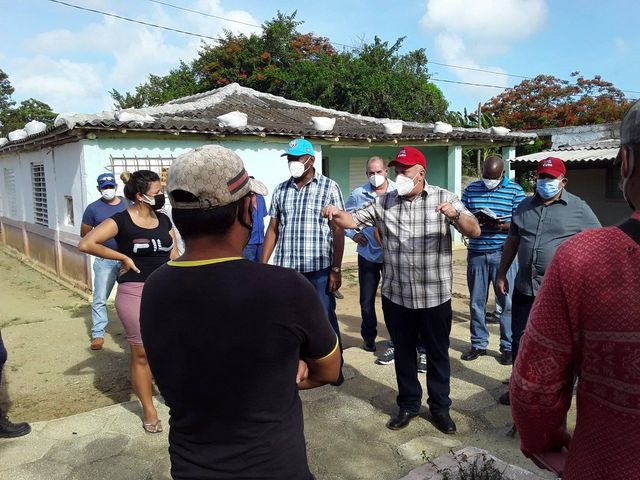
If Jorge Luis Tapia Fonseca, Deputy Prime Minister of the Republic of Cuba, made something clear in a tour of popular councils in the north of Chambas municipality, many of the solutions to the pressing problems caused by COVID-19 can be solved from the endogenous with the assistance of all members of the community.
True to his style of work, allergic to justifications in the face of wrongdoing, in a permanent battle against bureaucracy and in connection with the people, he traveled, together with his work team, to the towns of Los Perros, Punta Alegre and Máximo Gómez to the follow-up of the measures to confront the pandemic.
In the first of these population settlements, with around 1,630 inhabitants, Tapia Fonseca was critical of the high levels of indiscipline, which are manifested in high mobility, non-compliance with sanitary protocols within the homes and deficiency in matters organizational factors in the face of the reality of 48 active cases, of which a dozen are children.
“If the social indiscipline continues here, then the Health System will not have enough resources to control the incidence and negative consequences of the disease. The best medicine is isolation, prevention”, the Vice Prime Minister assured.
Much emphasis was placed on the need to guarantee the number of couriers in order to distribute food and other essential resources to the houses, in order to isolate and reduce mobility. On this last issue, he said that those who violate the closing hours should be fined in the maximum amount, and even, in more serious cases, the opening of judicial files for causing the spread of the pandemic.
Community factors must function adequately in the application of strategies to cut the chains of contagion. A good part of the success against the disease will depend on this integration.
In addition, as part of the visit, in which Jorge Luis Broche Lorenzo, member of the secretariat of the Central Committee of the Communist Party of Cuba (PCC), Carlos Luis Garrido Pérez, first secretary of the Party in the province, and Governor Tomás Alexis Martín Venegas participated, the progress of works for the benefit of the community was checked, such as the installation of a public telephone, the repair of the small square, the start-up of a turbine for the supply of water and the operation at night of a car in case of medical emergencies.
Later, at the Joaquín de Agüero y Agüero Urban Pre-University Institute, in Punta Alegre, the delegation spoke with the residents about everything that can be done to eliminate the spread of the virus.
"You have to put the same enthusiasm to the confrontation with the pandemic as we do with the time of celebratuon", Tapia Fonseca said with a view to renewing the methods of action and actively involving the residents.
It is inconceivable that there are not all the messengers when many people do not have work and can charge 2,200 pesos for these functions, in addition to the fact that workers from other sectors remain at home receiving salary benefits or with fewer responsibilities than in normal times and could join the task.
Tapia Fonseca stated that if all road access are closed, both in Punta Alegre and in Máximo Gómez (also known as El Central), they would be in a position to achieve favorable epidemiological indicators comparable to those of la Isla de la Juventud.
This last action, along with others such as the anti-COVID-19 vaccination, the application of Biomodulin T to those over 65 years of age and Nasalferon to pregnant women in the third trimester of pregnancy, can deal the final blow to the pandemic.
However, it is necessary not to lower our guard because "the Abdala does not solve the problem alone, we must also get the vaccine of discipline and demand."
In the meeting with the people, it was also made clear the urgent need to change old methods in the attention to the proposals; a faster solution, stripped of bureaucracy, based on available resources and the human sensitivity of managers to all the demands of the residents.
